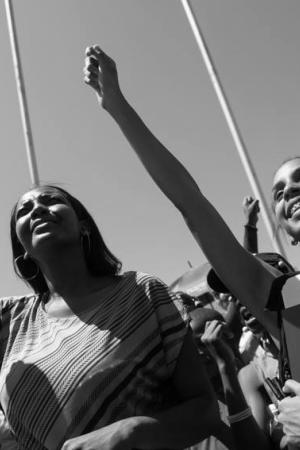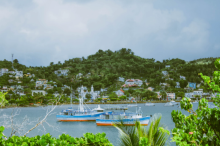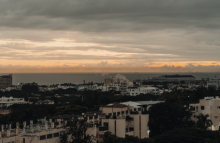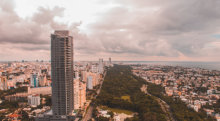“When you go to universities, staff tell you that you do not have anything to study (referring to identity documents) but what can we do if we do not have control of these things? We have to continue fighting against the denial of our right to Dominican nationality until we get results.”
Young changemaker
KEY ISSUES
- In 2013, a landmark court ruling deprived over 130,000 Dominicans of foreign (mainly Haitian) ancestry of their nationality.
- In 2014, a law aiming to restore the nationality of those who had been affected by the ruling was adopted, but this has not been fully implemented to date.
- There are no official statistics on statelessness in the Dominican Republic, but a 2022 report estimated that 137,794 people were still affected by the ruling.
- Racial discrimination persists in the country and is one of the main causes of statelessness.
- The Dominican Republic does not provide for access to nationality for children born in the country who would otherwise be stateless or for foundlings; nor is there facilitated naturalisation for stateless people or safeguards to prevent statelessness as a result of deprivation of nationality.
- The Dominican Republic is not a party to either the 1954 or 1961 Statelessness Conventions and has no framework in place to identify and provide protection to stateless people.
STATELESSNESS IN THE DOMINICAN REPUBLIC
The Dominican Republic is home to a significant number of stateless people and people at risk of statelessness – a notorious case in the Americas. Large-scale statelessness has been caused by the denial and deprivation of nationality for Dominicans of foreign (mainly Haitian) ancestry through the discriminatory 2013 Constitutional Court decision known as ‘La Sentencia’. The ruling affected people born in the Dominican Republic retroactively to 1929, without reviewing whether these people had nationality elsewhere. The Dominican Government maintains that the people affected by La Sentencia are not stateless because these individuals still have the right to a nationality in Haiti, through their Haitian ancestry. However, an inability to establish Haitian nationality due to their parents’ lack of government-issued documents means that there is no guarantee of Haitian nationality for those affected. The Inter-American Commission on Human Rights describes La Sentencia as “the product of structural racial discrimination against persons of Haitian origin and descent”. In 2014, a new law to restore the nationality of those who had been affected by the ruling was adopted, but this has not been fully implemented to date.
The Dominican Republic has not acceded to the Statelessness conventions, has no statelessness-specific identification or protection procedures in place and minimises the existence of the problem of statelessness in the country. The Dominican Republic is marked by an asterisk (*) in UNHCR’s global statistics, denoting the lack of reliable data about the number of stateless people in the country. Progress to remedy the situation of arbitrary deprivation of nationality caused by La Sentencia continues to be difficult to track but a 2022 report estimated the number of people still affected at around 137,794. This number includes available official figures for the number of children born between 2010 and 2017, totalling 46,235 people, who were unable to gain documentation as a consequence of the enduring intergenerational impact of La Sentencia.
Although the Constitution protects the social rights of every person without discrimination, including on the basis of colour or nationality, Dominicans of Haitian descent and denationalized people face multiple obstacles in accessing basic rights. Lack of nationality and documentation is a barrier to obtaining any form of protection or assistance. Due to widespread racial and social discrimination, stateless and undocumented people in the Dominican Republic face the denial of multiple rights, including to move freely within and outside of the country, participate in political life, study, work in the formal economy, and receive unhindered medical assistance. As such, those denied the right to a nationality are more likely to be excluded from Dominican society and are found to be in vulnerable conditions, rural areas of the country (bateyes) and disadvantaged neighbourhoods.
THE RIGHT TO NATIONALITY IN THE DOMINICAN REPUBLIC
The rules regulating access to nationality can be found in the Dominican Constitution, where the provisions have seen multiple changes over the years. Nationality in the Dominican Republic is acquired through a combination of jus sanguinis and jus soli. Under the 1929 Constitution, the Dominican Republic granted citizenship through the principles of jus soli to any person born in the country, with the exception of children born to foreign diplomats and children born to parents who are “in transit” – the latter group being defined through the 1939 Migration Law as those in the country for ten days or less, with the purpose of reaching another destination. In 2004, the Dominican Republic enacted Migration Law 284-04, which in Article 36 expanded the “in transit” exemption to apply to all non-residents, including temporary workers, and established a new system for the acquisition of Dominican nationality. This change effectively deprived children born to parents with an irregular migratory status of access to Dominican nationality, in violation of the Constitution in place at the time. In 2010, a new Constitution was approved in the Dominican Republic. The interpretation of who is excluded from jus soli under Migration Law 284-04 was codified in the constitution, according to which the children of parents in an irregular migratory situation in the Dominican Republic would not be entitled to Dominican nationality.
In 2013, the Dominican Constitutional Court issued ruling TC/0168/13 (“La Sentencia”), which retroactively deprived those born in the Dominican Republic of their Dominican citizenship if their parents were migrants in an irregular situation at the time of their birth – even though they had been recognized as citizens according to the laws in effect between 1929 and 2010. This decision was estimated to have affected 133,770 people born in the Dominican Republic and has had a disproportionate impact on those of Haitian descent. The Dominican Republic was the only country of nationality and of habitual residence for most people affected. Many of those impacted had, in fact, been registered in the Dominican Civil Registry (“Registro Civil”), received official birth certificates and identity cards (“cédulas de identidad”), and lived in the Dominican Republic all their lives. The Court ruling violated the Dominican Constitution, which had guaranteed Dominican nationality to those born on Dominican territory prior to 2010 and which also obligates the state to respect the treaties to which it is a party, including those that guarantee the right to a nationality and prohibit discrimination.
The adoption of Naturalisation Law 169-14 in 2014 aimed to remedy the effects of the 2013 Ruling through differentiated procedures for many of the people affected, who were divided into two groups:
- “Group A”: those previously registered on the Civil Registry and entitled to restoration of their Dominican citizenship and recognition or provision of their identity documents, and who have not yet received their nationality documents;
- “Group B”: those who were never registered but who had the right to Dominican nationality under the Constitution when they were born, whose status must be regularised via naturalisation, and who are either waiting to access the naturalization process to regain their Dominican nationality or who were eligible to participate in the registration process but were unable to do so.
Law 169-14 has been heavily criticised, including by the Inter-American Commission on Human Rights (IACHR), on the grounds of that it treats Dominican citizens as foreigners, thus violating their right to a nationality, and has been only partially implemented by Dominican authorities over past years. To date, no one who had previously not been in possession of Dominican papers have been naturalised under the route provided for in Law 169-14.
There are no safeguards in law for children born in the country who would otherwise be stateless to acquire Dominican citizenship, nor the law does provide for acquisition of citizenship by foundlings. Moreover, mothers of Haitian descent and/or undocumented face obstacles in registering their children at birth regardless of having the constitutional right to do so. The law does not offer a pathway to facilitated naturalisation for stateless people, nor does it contain safeguards to prevent statelessness from occurring as a result of loss or deprivation of Dominican nationality.
ARBITRARY EXPULSIONS
There has been a notable tightening of the Government's immigration policies starting in 2021, in response to the worsening crisis in Haiti. People of Haitian origin are subject to greater restrictions on their mobility and ability to enter the country, renew their immigration status or access Dominican nationality. There has been an unprecedented increase in detentions, arbitrary expulsions and persecution of people of presumed Haitian origin, based on their skin colour, both in regular and irregular immigration situations. This has also affected denationalized people or people at risk of statelessness.
After a suspension of deportations to Haiti between March and September 2020, deportation numbers reached 40,203 people in 2021 and then climbed to 120,812 people in 2022. In 2022, human rights defenders reported to have prevented at least 800 expulsions. In reaction to calls from international organizations to suspend deportations to Haiti, the president announced the intensification of expulsions in November 2022. During 2023, approximately 250,000 people were deported, far exceeding the already historically high level reached the previous year. Pregnant migrant women and children have been caught up in these mass deportations.
STATELESSNESS AND LACK OF DOCUMENTS DURING THE COVID-19 PANDEMIC
During the global pandemic, in response to the health crisis, the Dominican government adopted assistance programs to mitigate the loss of income of individuals and companies in the formal and informal sectors. However, migrants and denationalized people were not able to benefit from these measures due to lack of Dominican documentation and access to social services was also limited. This exclusion exacerbated pre-existing inequalities in the country. The loss of jobs in the formal sector and the limited circulation of money in the informal sector disproportionately affected stateless people and those at risk of statelessness. Only 10% of the people in “Group A” were able to access the program called “Stay at Home.” Moreover, closure of the offices in charge of naturalization applications and renewal of immigration documents during the pandemic exacerbated exclusion.
The majority of children and adolescents who are stateless or at risk of statelessness were not able to follow distance education during the pandemic due to lack of access to electricity, internet and educational support at home. Importantly however, despite the initial hard-line stance that only documented Dominicans would have been included in the roll-out of COVID-19 vaccines, national civil society groups successfully advocated for the inclusion of stateless and undocumented people in vaccine access.
THE DOMINICAN REPUBLIC’S INTERNATIONAL COMMITMENTS
The Dominican Republic has not ratified either the 1954 or 1961 Statelessness Conventions. The Dominican Republic has acceded to the CRC, ICCPR, CEDAW, ICERD, and CRPD, for which it maintains no reservations against the provisions relating to nationality, but not to the ICMW. For more information on the Dominican Republic’s regional commitments, see the StatelessHub Americas page.
- Click here to see what relevant Recommendations the Dominican Republic has received through the Universal Periodic Review.
- Click here to see what relevant Recommendations the Dominican Republic has issued through the Universal Periodic Review.
- Click here to see any voluntary pledges made by the Dominican Republic on nationality and statelessness.
Violations of the right to a nationality, as protected in the American Convention on Human Rights, have been found by the Inter-American Court of Human Rights in two cases brought against the Dominican Republic: that of the Yean and Bosico Children (2005) and that of the Expelled Dominicans and Haitians (2014). Statelessness and non-documentation in the Dominican Republic continues to be the subject of efforts within the Inter-American human rights system to ensure an effective remedy, including through a hearing on the ‘Situation of Human Rights of Migrants and Their Families in the Dominican Republic’ before the Inter-American Commission on Human Rights (IACHR) which recommended the State Party to resume dialogue on denationalised people across the country with civil society groups. In 2023, IACHR once again highlighted the persistent challenges in terms of immigration detention, expulsion and access to nationality for people of Haitian descent and urged the State to eradicate the situation of statelessness.
The content on this page was completed in collaboration with Dominican@s por Derecho (DxD)
[Last updated December 2023]
Cover image by Dominican@s por Derecho (DxD)
Further reading
VOICES & EXPERIENCES
-
Lost Livelihoods for Stateless and Undocumented People in the Dominican Republic
![DR 1]()
Lost Livelihoods for Stateless and Undocumented People in the Dominican Republic
![DR 1]()
“In this pandemic, the government has helped many people. Those who have an identity card are getting food and monthly deposits of funds. Any kind of help goes to those with documents, and those without get nothing. My [Dominican] mother-in-law and neighbours receive funds on their card [government social assistance programme]. Whenever they are going to distribute something, they say it’s for people with documents and those without shouldn’t come. I feel so bad. Sometimes it really weighs on me. Sometimes I say, look how the people with identity cards are getting food, and if I had gotten my ID, I would be getting funds and food for my children.”
Nadia
Affected person
Nadia, a 25-year-old stateless woman and mother of three stateless children, laments the exclusion of undocumented people from government programmes to mitigate the economic impact of COVID-19. Despite having registered for naturalisation following the passage of Law 169-14 in 2014 and receiving a regularisation card, the government has yet to deliver on its promise to naturalise over 7,000 stateless descendants of Haitian migrants. Their regularisation card is now expired, with unclear procedures in place for renewal or naturalisation as Dominican citizens.
-
Increased Persecution, Detention and Arbitrary Expulsion in the Dominican Republic
![DR 2]()
Increased Persecution, Detention and Arbitrary Expulsion in the Dominican Republic
![DR 2]()
“I woke up because I heard the noise of doors breaking and padlocks breaking. I started calling friends on the phone to warn them. I looked outside and saw a lot of people running around in a panic, crying and screaming. I heard one of the soldiers say “Oh, do you have a machete?” There were three of them and they began to beat him. I heard him asking them in Spanish to “stop hitting me”. When I found out that they had taken two small children who I know have no parents in the community, I went out. I wanted to try to give them some money, but the soldiers wouldn't let me, they told me to leave. I saw that they had taken the younger brother of my work colleague dressed only in a shirt and underpants, and they had used plastic straps to hold his hands behind his back. The soldiers were acting very aggressively.”
Juan
An alarming aspect is the persecution, detention and arbitrary expulsion of stateless and undocumented people in the Dominican Republic, especially children and adolescents. Despite the context of insecurity in Haiti, the economic and public health impacts of the COVID-19 pandemic, and the demands of national and international organizations, there has been a historic increase in deportations. Late 2022, Juan, one of the witnesses of an immigration operation in Batey Libertad (in the northern part of the country) shared his testimony of what happened in the community.
Voice from Yspaniola, Report on raid, detention, separations of
-
A Decade of Struggle: Challenges in the Restitution of Nationality in the Dominican Republic
![DR 3]()
A Decade of Struggle: Challenges in the Restitution of Nationality in the Dominican Republic
![DR 3]()
What has happened in the country since the 2013 Sentence:
“These ten years have marked the normalisation of the Dominican denationalisation at the national and international level. There were 133,000 people affected by the Sentence and it turns out that, as of today, this number has disappeared. After 10 years, we have to rethink and reevaluate everything. Risky conditions continue in the country. We have reached a situation of tension where people are being removed from hospitals, arbitrary expulsions continue, etc. In our own country, suddenly people arrive and knock down doors. There is a lot of fear and many threats but we have to come out today with enough energy to have a clearer horizon and more trust among ourselves.”
Beneco Enecia
Coordinator of the Dominican@s por Derecho (DxD) Platform
Understanding lived experiences:
“I have the opportunity to be here today and also speak on behalf of other young people who are in my same situation. When you go to universities they (staff) tell you that you do not have anything to study (referring to identity documents) but what can we do if we do not have control of these things? We have to continue fighting against the denial of our right to Dominican nationality until we get results.”
Affected person
23 September 2023 marked the 10th anniversary of the Sentence 168-13 (“La Sentencia”) that denationalised at least 133,000 Dominicans, mainly of Haitian descent, in the Dominican Republic. Ten years on, thousands of people have not had their Dominican nationality effectively recognised, and continue to face daily threats, arbitrary detentions and possible expulsions from their own country. The Domincan@s por Derecho (DxD) Platform, a collective of different civil society organisations that promotes equal access and to all public services related to nationality, civil registration, and identity in the Dominican Republic, organised an event that sought to take stock of the status quo with a view to redoubling efforts towards lasting solutions. This involved strengthening and realising the right to Dominican nationality for those people in the Dominican Republic who hold this right under the Constitution when they were born.
Voice from https://mailchi.mp/145200652e87/monthly-bulletin-july-13560159
Latest Resources: Dominican Republic
-
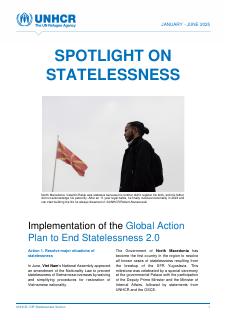
Spotlight on Statelessness January-June 2025
Type of Resource: Report
Theme: General / Other
Region: Global / Other
View -
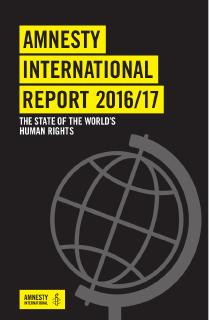
Amnesty International Report 2016/17: The state of the world’s human rights
Type of Resource: Report
Theme: General / Other
Region: Global / Other
View -
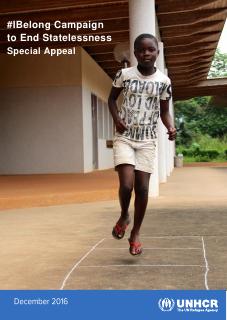
#IBelong Campaign to End Statelessness Special Appeal
Type of Resource: Report
Theme: General / Other
Region: Global / Other
View
